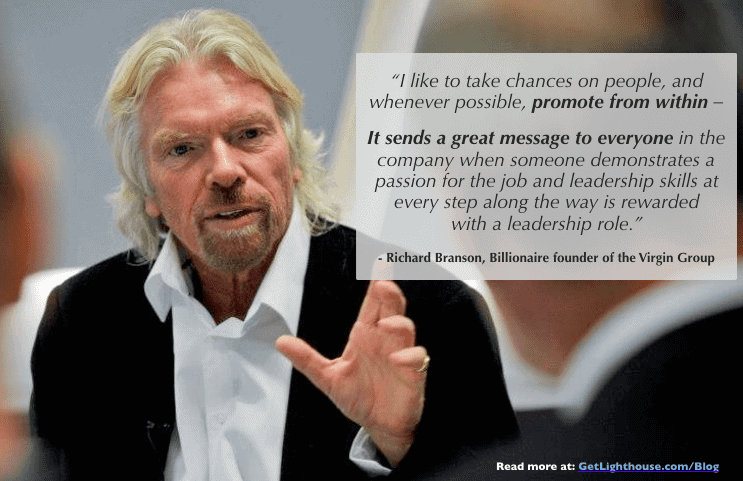Do you feel like there are enough solid leaders on your team?
Or are you struggling to help your managers level up as you grow in your role, too?
Do you feel confident your team is ready to step up and take on more leadership responsibilities?
Recognizing a future senior manager on your team is essential for a few reasons. According to a survey by The Workforce Institute at Ultimate Kronos Group and Workplace Intelligence, almost 60% of leaders report feeling worn out at the end of each day.
Burnout is a serious issue among managers, especially as new people are added to their team.
As this image from StackOverflow shows, it becomes geometrically more complex to manage a team as it grows; every person you add is more challenging than the last.
As you manage more people, you have to consider more lines of communication, more tasks, as well as everyone's motivations. And as you rise in an organization the challenges and complexities only grow.
The solution? Promoting from within.
Now, your company may be tempted to go for a quick and easy fix and try to find senior external hires. However, this can further complicate things and may not produce the results you were hoping for.
A workplace study by Wharton management Professor Matthew Bidwell found that external hires:
- Tend to get, "significantly lower performance evaluations for their first two years on the job than do internal workers who are promoted into similar jobs.”
- And have, "higher exit rates, and they are paid about 18% to 20% more”
Instead, promote from within. In doing so you will:
- Reward existing employees for great performance
- Be sure that those who are senior managers fit your culture
- Retain more of your best people as more roles open up as you grow
- Save money and time on external recruiting costs
- Avoid the turmoil of senior managers leaving and shaking up your organization
Today's post is all about how to recognize senior leadership potential on your team and help your best managers become pillars of your organization.
4 Questions to Evaluate a Manager's Senior Leadership Potential
As Richard Branson puts it, promoting from within shows your team members you're willing to reward their hard work and passion and invest in their future.
But how can you tell who on your team is ready to become a senior leader? Let's take a look at the 4 questions you need to ask yourself and talk to them about:
- How good of a listener are they?
- Do they maximize their 1 on 1s with their team?
- How developed is their Emotional intelligence?
- Do they seek and accept feedback from their team?
1. How good of a listener are they?
Being a good listener can help you unlock valuable insights and improve your team's performance. It's vital for things like building rapport and uncovering issues you didn't know existed.
If you notice a manager on your team is a great listener, that could be a big indicator of their senior manager potential. Think back on their interactions with others:
- Are they focused on the things the other person is saying to them?
- Do they pause and give the other person time to fully express themselves instead of just waiting for their turn to speak?
- Do they ask follow-up questions to understand the other person's point?
If the answer to these questions is yes, they'll likely be great at getting the most out of their 1:1s and understanding others, which are essential for every senior manager.
Level up their listening skills
To improve their listening skills, teach them the concept of active listening:
As the image above shows, the three levels of active listening are:
- Repeating someone's message using their exact words
- Stating their message using similar words
- Rephrasing their message using your own words to confirm you understand it
The third degree is the best form of active listening, as the listener is showing they understand the person speaking on the deepest level; by using their own words, and getting the confirmation of the speaker, everyone is certain to be on the same page moving forward.
For more information on active listening and other vital skills you could teach future senior leaders:
- 15 Skills Senior Leaders Must Master to Be Great Managers of Managers
- How managers can be more effective listeners
2. Do they maximize their 1 on 1s with their team?
1:1s are every manager's most powerful tool. They can lead to improvements across a variety of areas, including:
- Poor communication
- Lack of feedback
- Career growth and development stalling
- Unclear purpose of work
- Bottled up frustrations
- Interpersonal and inter-team conflicts, and others.
They are also incredibly valuable when it comes to engaging your team, as pointed out in a study reported in the Harvard Business Review:
"Employees who got little to no one-on-one time with their manager were more likely to be disengaged. On the flip side, those who get twice the number of one-on-ones with their manager relative to their peers are 67% less likely to be disengaged."
If a manager on your team swears by 1:1s like David Cancel, they're probably experiencing some of these benefits, and avoiding many common team problems.
This is why teaching them how to structure and facilitate even more meaningful conversations is a great idea. If their aim is to become a great senior leader, there are a lot of situations they have to be ready for. Here's how you can help prepare them.
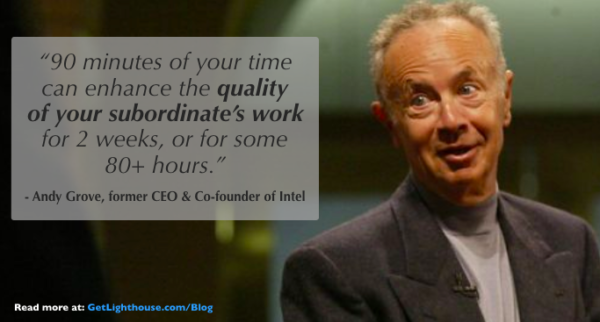
Show them these foundation blocks for having even better 1:1 meetings
Mastering 1:1s requires different skills and strategies (click the links to learn more you can teach), such as:
- Preparing for every meeting by creating a meeting agenda
- Bringing good questions to ask to get your team members to open up
- Understanding how to evolve 1:1s over time and prevent conversations from getting repetitive and stale
- Mastering the skill of leveling up and building relationships with senior leaders
- Knowing what to ask to get your team through a crisis
- Supporting remote employees
- Using skip level meetings to truly understand how their team is doing
And if all of this is overwhelming and they just want one resource to learn everything about 1:1s, send them to the following link:
3. How developed is their Emotional intelligence?
Emotional intelligence (or EQ) is the single most important soft skill a senior manager can have.
Management is all about understanding people. After all, we are much more than machines completing tasks.
Someone with a high level of emotional intelligence will build deeper connections, be better at listening, and understand the people they work with.
On the other hand, a lack of emotional intelligence can negatively influence a manager's relationships with their team and prevent them from identifying issues before they snowball.
High emotional intelligence is almost like a 6th sense because it allows you to do things like:
- Sniff out and address hidden issues
- Tell when someone isn't telling you the entire truth and ask follow-up questions to find out what's really going on
- Read the room to understand how people feel about your ideas or how a meeting or speech is going
- Build buy-in quickly and effectively, even when a change is unpopular
The effects of having high emotional intelligence are very tangible - a study by researcher Christine Porath and her team at Georgetown University found the leaders with low EQ were facing the following issues:
- 63% of employees wasted time avoiding them
- 75% of employees said that their commitment to their job had weakened because of their manager
- 12% quit their job specifically because of bad leadership
Now, your team member doesn't have to be a social butterfly to succeed as a senior manager, but it's important that they work on their EQ. That's because being able to read other people's perceptions and feelings is crucial for building long-term relationships.
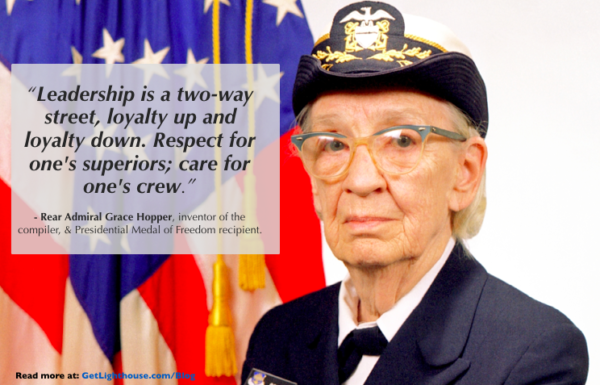
Help your team member develop emotional intelligence
According to author and psychologist Daniel Goleman, emotional intelligence is based on four pillars: self-awareness, social awareness, self-management, and relationship management.
Here are three ways your team members can improve in these areas:
Practicing mindfulness. Mindfulness helps you develop in all four areas of emotional intelligence at the same time, because it keeps you thinking in the present.
It also makes you a better communicator and leads to a more balanced personality. For a simple mindfulness exercise they can do in just 5-10 minutes a day, click here.
Learning to accept feedback without becoming defensive. According to Rachel Green, Director at The Emotional Intelligence Institute in Western Australia:
"Being able to hear feedback without becoming defensive is an essential skill for a leader, and one that reflects an emotionally intelligent leader.”
Unfortunately, many leaders' emotions such as pride or anger prevent them from hearing people out and reacting to their feedback. We have a great post on how to prevent your team member from reacting in a similar way.
Using 1-on-1s to develop empathy and understand people's feelings. According to researcher Giacomo Rizzolatti from the University of Parma, all of us are equipped with a "mirror neuron system”. What this means is that our brain cells enable us to mirror other people's emotions and share their person's pain, fear, or joy as long as we spend enough time with them and have felt something similar in the past.
Teach a potential senior manager to be curious about people's goals, challenges, and motivations - and they'll be able to increase their EQ and be a more empathetic leader. Here's how you can do that in your 1 on 1s.
Using these techniques will turn someone who is "good with people”, into a leader everyone will want to open up to naturally, including other managers.
4. Do they seek and accept feedback from their team?
Being able to accept feedback is critical for all of us, and especially senior leaders. As this quote from Colin Powell reminds us, without it, you're at risk of losing the trust of your team.
As a manager, If you truly listen to feedback, you'll get valuable insights from your team that could improve you, your team, the entire organization, the way you communicate, and many other things.
The role of senior managers is to develop the leaders under them and look out for the macro behaviors & culture across their department. For that to happen, they need continuous feedback to find opportunities for their own and their team's improvement.
Some people are naturally good at processing and accepting feedback. These people are often great listeners and possess high Emotional Intelligence as well, as these skills are interconnected. If you see those traits in them, it's a sign of strong leadership potential. Here's how you can work with them to turn the feedback they get from others into an advantage.
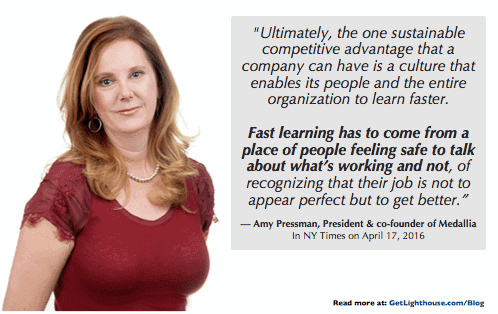
Teach your team member how to get more feedback
While encouraging feedback from someone is hardly an exact science, here are 5 techniques you use to help a future leader on your team do it:
- Ask for feedback often and make your questions as specific as possible. This way, you'll avoid vague answers and waiting for them to come to you first, which may never happen on its own.
- Be grateful and accepting of feedback. Don't let your emotions get the better of you, and always assume positive intent behind people's words. If you're easily offended, people are unlikely to give you feedback in the future.
- Take action on what you learn. Feedback is meaningless unless you take action to improve based on it. Make it a point of always acting on people's words to make them feel heard and valued.
- Use reciprocity and give them feedback. Reciprocity is hard-wired into our way of thinking, as proven by psychologist Dennis Regan. If you give feedback, they'll be more likely to do the same based on your behavior.
- Lead by example and encourage a culture of feedback. As a leader, there is nothing more important than the example you set. It's your role to set an example for your team, so make feedback part of your company culture.
We've written in-depth instructions on how to make feedback a key part of your culture, which you can read below:
We also have a post that contains 1:1 meeting questions related to giving and receiving feedback:
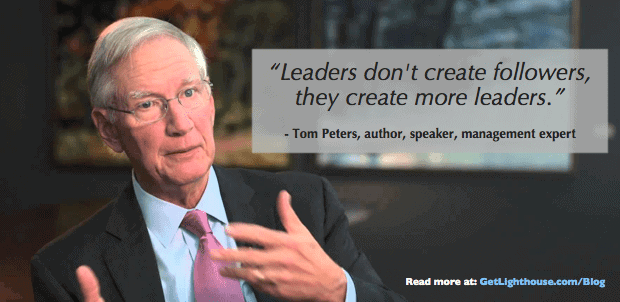
Great senior managers are rare - use every opportunity you have to develop them
"Each day, 10,000 baby boomers retire and begin receiving Medicare and Social Security benefits.”
- Sen. Rob Portman, writing in The Wall Street Journal, July 22, 2014
If this quote by Senator Portman sounds worrying, knowing more than 77% of organizations feel they don't have enough leaders at their company will make you want to develop senior leadership skills on your team even more.
A new generation of leaders is desperately needed, and it's your task to make sure your most talented people are prepared for the next step in their careers.
When considering if someone's fit for being a senior manager in the future, ask yourself:
- Do I like the example they're setting? Will their team benefit from their traits?
If the answer is yes, start working with them on the 4 key skills mentioned in this post.

